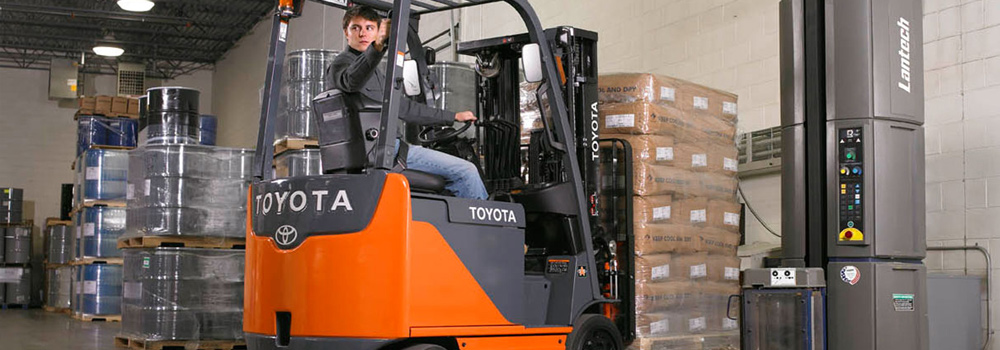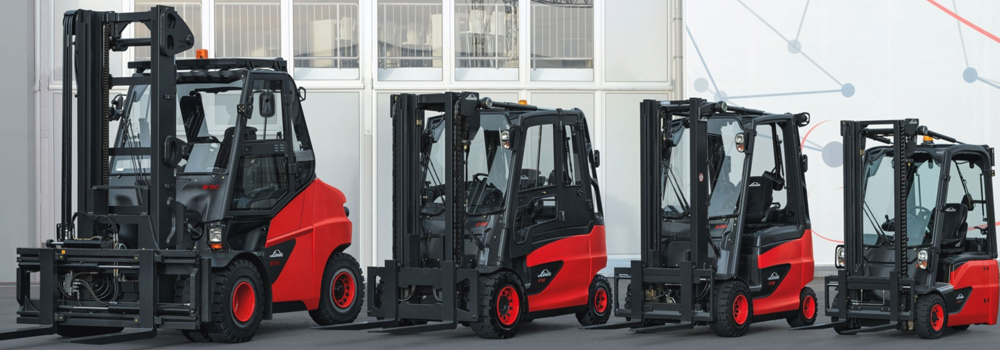Summary
- Learn about lithium-ion forklifts and their use cases
- Discover the benefits of lithium-ion forklift batteries compared to lead-acid
- Find out which manufacturers produce lithium-ion forklifts
Why deal with the complex mechanics of a petrol or diesel forklift? Instead, you could be living in electric dreams with lithium forklifts. With less maintenance, lower running costs and environmental sustainability, there are plenty of reasons why your business should switch to lithium-ion lifting devices. In this article, we’re going to explain how lithium forklifts work, as well as highlight why you should make the change.
What is a lithium battery powered forklift?

Toyota electric forklift. Source: toyotamhs.com
A lithium battery-powered forklift is a type of industrial vehicle that is powered by lithium-ion batteries, as opposed to traditional lead-acid batteries. These forklifts are used to lift and move materials over short distances.
These differ from traditional lead-acid electric forklifts because they benefit from much longer operating times and multi-shift operations. This is because lithium-ion batteries are much more efficient and faster charging than traditional lead batteries. Almost all forklift models are now available with lithium-ion batteries as standard, including electric pallet trucks, stackers and heavy-duty forklifts capable of lifting up to 4 tons.
Find Your Perfect Forklift
Compare Quotes from Local Forklift Dealerships


Enter Requirements


We Find the Best Deal


Receive your Quote
Typical use cases for lithium forklifts
Lithium forklifts are taking over traditional lead acid battery devices. Lithium forklifts have a variety of operations, but some of the core business tasks for clean operation devices powered by electric forklift batteries take place in indoor warehouses, fulfilment centres, garden centres, builder’s merchants, retail spaces and almost any commercial area of the material handling industry. Lithium forklifts are versatile, durable and ideal for the transportation, loading and unloading of heavy items, and the cost of ownership over time can be significantly less than operating a fleet running on lead acid batteries.
Benefits of lithium battery-powered forklifts vs. lead acid batteries
Lithium batteries offer a broad variety of advantages over diesel, petrol and lead acid batteries. Some of the most common reasons that your company should consider using lithium forklifts include:
Low downtime
Long charging periods hinder standard electric forklifts with lead-acid batteries. With lithium-ion forklift batteries, you can expect longer, multi-shift operation. When the time comes to charge your lithium forklift, simply plug it in and, by the time you’ve had a quick coffee, your device will be back in the game. In fact, it can be beneficial to have an individual take their lift truck to the charging station during one of their 15-30 minute breaks, as batteries for lift trucks charge within 10-20 minutes. You won’t need to undergo the time-consuming task of exchanging lead-acid batteries, either. In addition to this, lithium forklift batteries have higher capacity and lower battery temperature.
Cheaper operating costs
Lithium forklifts are considerably cheaper to run than diesel or gas-powered devices. It’s possible to fully charge a lithium forklift for a fraction of a percentage of what traditional fuels cost – and with the ongoing rising energy costs, what you could save in the long term will help your business. The cost of ownership of lithium-ion forklift batteries is expected to go down over time, too.
Low maintenance costs
Lithium forklifts are a marvel of engineering, in that they contain much less complex moving parts in comparison to combustion-based models. This means that forklifts powered by li-ion batteries are considerably lower-maintenance and will cost less to keep running in the long term. For a virtually maintenance-free device, choose energy-efficient lithium batteries every time. You’ll avoid unplanned downtime, spend less on fleet maintenance and enjoy faster charging times at no extra cost.
Lack of noise and pollution
Older forklift models can be a cause of noise and pollution – and this can be particularly troublesome in enclosed spaces such as a warehouse. Instead, lithium forklifts are practically silent in their operation, making for a more peaceful and less stressful working environment.
Longevity
Lithium batteries tend to last between two and four times as long as traditional rechargeable lead-acid batteries. This means that lithium forklifts are much more cost-effective in the long run. In addition to saving money on batteries, you’ll also see an uplift in productivity, as li-ion batteries have greater battery capacity and require less frequent charging.
Minimal wasted energy
When it comes to efficiency, lithium forklifts simply won’t be beaten. This is because lithium batteries charge at almost 100% efficiency. In other words, every bit of energy extracted from your charging point transfers for use as power in your fleet – and at a low cost to businesses, too.
Environmentally friendly
Lithium forklifts have no emissions and, with long battery life, you can expect to witness less battery disposal in the future. By switching to lithium-ion electric forklifts, your company can help offset its carbon footprint and allow you and your team to do their bit for the environment. While the initial cost may seem slightly more, you’ll spend less on labour costs and less on the replacement of industrial batteries over the lifespan of your devices, in comparison to lead-acid forklift batteries. Just how environmentally friendly lithium-ion forklifts are will depend on a variety of factors, including the end use and the source of electricity used to charge the battery.
Risks of lithium battery-powered forklifts
Lithium battery-powered forklifts, while offering several advantages over traditional lead-acid batteries, do come with their own set of risks. These risks primarily revolve around safety and environmental concerns.
One potential risk is that lithium-ion batteries can pose a fire hazard if damaged, punctured, or improperly charged. This risk, however, can be mitigated through proper care and maintenance. Similarly, if lithium-ion batteries become unstable, they could pose a high risk of ignition.
Another concern is that lithium batteries can become damaged if they aren’t properly monitored, adding an extra layer of complexity to their use. They also emit slight fumes during the workday that, over time, can lead to health issues, though this can be addressed with proper venting in facilities.
Additionally, lithium-ion batteries require specialized disposal, as they can poison the environment if not disposed of correctly.
On the other hand, lithium-ion batteries can make forklift operation safer in some ways. For instance, one of the most significant hazards of using a lead-acid forklift battery is overcharging, which can cause the electrolyte solution inside to become hazardous. Lithium-ion batteries, in contrast, are less prone to this risk.
While lithium battery-powered forklifts offer several advantages, it’s essential to be aware of and properly manage their associated risks.
Best lithium-ion forklift manufacturers

Linde electric forklifts. Source: linde-mh.co.uk
No two businesses are alike, and the best manufacturer will depend on the applications of your company. However, some of the most popular manufacturers of lithium-ion electric forklifts include:
Each of these manufacturers has been at the forefront of lithium-ion technology. You can expect great after-sales service and advice on how to keep your lithium forklifts running optimally from each of these companies, who are committed to producing safe, effective, durable and environmentally friendly warehouse equipment.
Conclusion
Lithium forklifts offer a huge range of advantages for distribution centres and warehouses. Ease of charging, low maintenance, worker satisfaction and ease of use are some of the primary reasons why businesses around the world are making the switch to lithium-ion devices.
The benefits of lithium forklifts aren’t purely convenient, either. You can expect to spend less on the overall maintenance of your warehouse fleet when you switch to lithium-ion forklift batteries, as they tend to be easier to diagnose and repair than traditional lead-acid, diesel and gas-powered forklifts.
Looking to supercharge your fleet with lithium-powered forklifts? Simply tell us what you’re looking for and we’ll connect you with trusted local dealers. Search for electric forklifts in my area.